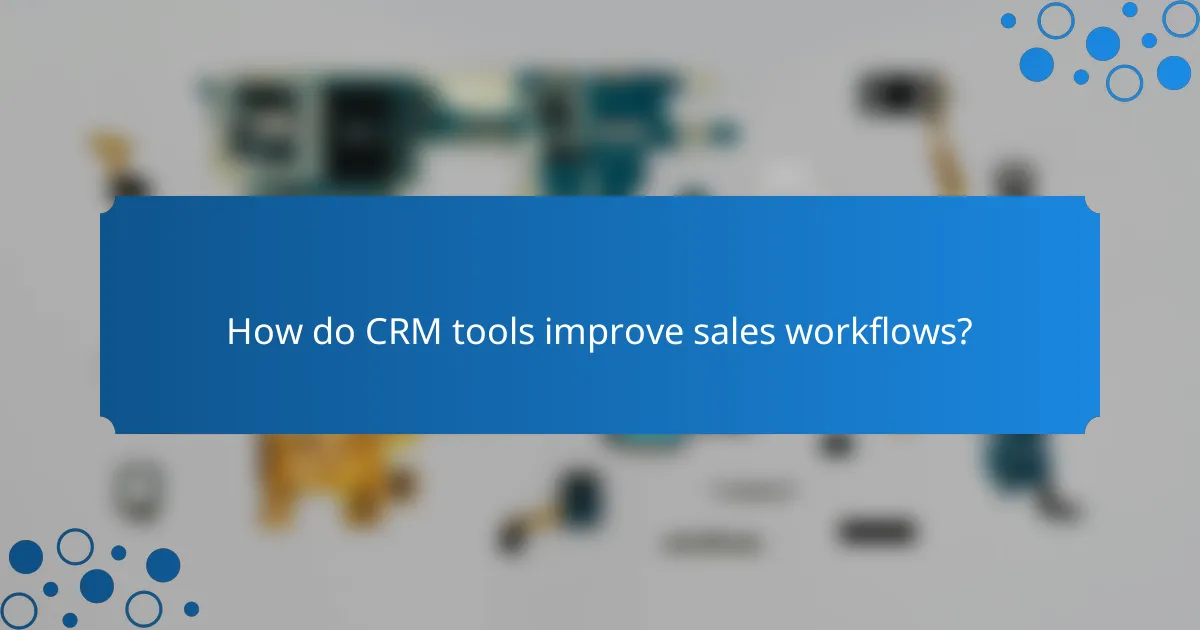Customer Relationship Management (CRM) tools are essential for businesses looking to optimize lead tracking, reporting, and automation. These tools not only provide robust features tailored to specific needs but also enhance efficiency by automating key processes. With comprehensive reporting capabilities, organizations can gain valuable insights into customer interactions and sales performance, enabling informed decision-making.
![]()
What are the best CRM tools for lead tracking in New Zealand?
The best CRM tools for lead tracking in New Zealand include solutions that offer robust features tailored to local businesses. Key considerations are ease of use, integration capabilities, and pricing that fits various budget ranges.
HubSpot CRM
HubSpot CRM is a popular choice for businesses in New Zealand due to its user-friendly interface and comprehensive lead tracking features. It allows users to manage contacts, track interactions, and automate follow-ups, all within a free tier that is appealing for small to medium enterprises.
With HubSpot, you can set up lead scoring to prioritize prospects based on their engagement levels. This helps sales teams focus on leads that are more likely to convert, enhancing overall efficiency.
Salesforce
Salesforce is a leading CRM platform known for its extensive customization options and powerful lead tracking capabilities. It offers advanced reporting features that allow businesses to analyze lead data and sales performance effectively.
For New Zealand businesses, Salesforce can be tailored to meet specific industry needs, but it may require a higher investment compared to other options. Consider starting with a trial to assess its suitability for your team’s workflow.
Pipedrive
Pipedrive is designed with sales teams in mind, offering a visual pipeline that makes lead tracking intuitive. Its automation features streamline repetitive tasks, allowing sales representatives to focus on closing deals rather than administrative work.
This CRM is particularly beneficial for small businesses in New Zealand looking for a straightforward solution. Pipedrive’s pricing is competitive, making it accessible for teams with varying budgets.
Zoho CRM
Zoho CRM provides a comprehensive suite of tools for lead tracking, including AI-driven insights and automation features. It is well-suited for businesses that need a flexible and scalable solution.
In New Zealand, Zoho CRM’s affordability and extensive customization options make it a strong contender. Users can easily integrate it with other Zoho applications or third-party tools to enhance functionality.
Freshsales
Freshsales offers a robust lead tracking system with features such as built-in phone, email, and activity tracking. Its intuitive interface makes it easy for teams to manage leads and customer interactions efficiently.
This CRM is particularly advantageous for New Zealand businesses looking for an all-in-one solution without the complexity of larger platforms. Freshsales provides a free trial, allowing users to explore its capabilities before committing to a subscription.

How do CRM tools enhance reporting capabilities?
CRM tools significantly enhance reporting capabilities by providing businesses with comprehensive insights into customer interactions and sales performance. These tools streamline data collection and analysis, enabling organizations to make informed decisions based on real-time information.
Customizable dashboards
Customizable dashboards allow users to tailor their reporting views according to specific metrics and KPIs that matter most to their business. This flexibility enables teams to focus on relevant data, such as sales figures, lead conversion rates, or customer satisfaction scores, all in one place.
For instance, a sales manager might configure a dashboard to display monthly sales targets alongside actual performance, making it easier to track progress and adjust strategies as needed. The ability to drag and drop widgets or choose from various visualization options enhances user experience and engagement.
Real-time analytics
Real-time analytics provide immediate insights into customer behavior and sales trends, allowing businesses to respond quickly to changes in the market. This feature is crucial for identifying opportunities and challenges as they arise, rather than relying on outdated reports.
For example, if a particular product sees a sudden spike in interest, a CRM tool can alert the sales team to capitalize on this trend without delay. Real-time data can also help in monitoring campaign effectiveness, enabling teams to pivot strategies based on current performance metrics.
Automated report generation
Automated report generation saves time and reduces manual errors by creating reports at scheduled intervals or on-demand. This feature ensures that stakeholders have access to the latest data without the need for extensive data entry or analysis.
Businesses can set up automated reports to be sent weekly or monthly, covering key performance indicators like sales growth, customer acquisition costs, or lead tracking metrics. This not only streamlines operations but also fosters a data-driven culture by making insights readily available to decision-makers.

What automation features are essential in CRM tools?
Essential automation features in CRM tools streamline processes, enhance efficiency, and improve lead management. Key functionalities include email automation, task management automation, and lead scoring automation, each contributing to a more organized and effective customer relationship strategy.
Email automation
Email automation allows businesses to send targeted messages to leads and customers based on their behavior and preferences. This feature can include automated welcome emails, follow-ups, and promotional campaigns, which save time and ensure consistent communication.
To implement effective email automation, segment your audience based on their interactions and tailor your messages accordingly. Utilize A/B testing to refine your email content and timing for better engagement rates.
Task management automation
Task management automation helps teams prioritize and track their activities related to customer interactions. This feature can automatically assign tasks to team members based on predefined criteria, ensuring that no lead is neglected.
Consider using a Kanban board or a task list that integrates with your CRM to visualize progress. Regularly review task assignments to ensure they align with your sales goals and adjust as necessary to maintain productivity.
Lead scoring automation
Lead scoring automation evaluates and ranks leads based on their engagement and likelihood to convert. By assigning scores based on actions like email opens, website visits, and social media interactions, businesses can focus their efforts on high-potential leads.
Establish a clear scoring system that reflects your business objectives and regularly update it based on performance data. This will help you prioritize leads effectively and allocate resources where they are most likely to yield results.

What criteria should you consider when selecting a CRM tool?
When selecting a CRM tool, consider integration capabilities, scalability options, and user interface. These criteria ensure the tool fits your business needs and enhances customer relationship management effectively.
Integration capabilities
Integration capabilities refer to how well the CRM can connect with other software systems you use, such as email marketing platforms, accounting software, or e-commerce solutions. A CRM that integrates seamlessly can streamline processes and reduce data entry errors.
Look for CRM tools that offer APIs or pre-built integrations with popular applications. This can save time and enhance functionality, allowing for better data flow between systems. For example, a CRM that integrates with your email service can automatically log interactions and track customer engagement.
Scalability options
Scalability options determine how well a CRM can grow with your business. A scalable CRM can accommodate increasing data volumes, users, and features without significant performance issues. This is crucial for businesses anticipating growth or changes in customer management needs.
When evaluating scalability, consider whether the CRM offers tiered pricing plans or additional features that can be added as your business expands. For instance, a small business might start with basic features and later upgrade to advanced analytics or automation tools as it grows.
User interface and experience
The user interface and experience of a CRM tool significantly impact user adoption and efficiency. A clean, intuitive interface can make it easier for team members to navigate the system and utilize its features effectively. Look for CRMs that offer customizable dashboards and straightforward navigation.
Consider conducting trials or demos to assess the user experience firsthand. A CRM that is difficult to use can lead to frustration and decreased productivity. Aim for a tool that provides training resources and support to help users adapt quickly.

How do CRM tools improve sales workflows?
CRM tools enhance sales workflows by automating processes, improving communication, and providing valuable insights into customer interactions. These systems help sales teams manage leads effectively and streamline their efforts to close deals.
Streamlined communication
CRM tools facilitate seamless communication among team members and with clients. By centralizing communication channels, such as emails and calls, sales representatives can easily track conversations and follow up promptly.
Utilizing features like shared notes and task assignments ensures that everyone is on the same page, reducing the chances of miscommunication. This is particularly beneficial in larger teams where coordination is crucial for success.
Centralized customer data
Centralized customer data is a key feature of CRM tools, allowing sales teams to access comprehensive profiles of leads and clients. This includes contact information, purchase history, and previous interactions, all in one place.
Having this data readily available enables sales representatives to tailor their pitches and follow-ups, increasing the likelihood of conversion. Additionally, it helps in identifying trends and preferences, which can inform future sales strategies.
Task prioritization
CRM tools assist in task prioritization by providing insights into which leads require immediate attention. Features like lead scoring help sales teams focus on high-potential prospects, optimizing their time and efforts.
By automating reminders and deadlines, CRM systems ensure that important tasks are not overlooked. This structured approach to task management can significantly enhance productivity and drive sales performance.